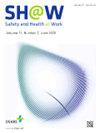在南亚促进非正规经济工作场所安全和健康的参与性培训活动——工会和雇主组织的作用
IF 2.9
3区 医学
Q1 PUBLIC, ENVIRONMENTAL & OCCUPATIONAL HEALTH
引用次数: 0
摘要
在南亚,非正规经济中的工人和雇主往往不在职业安全和健康服务的法律框架范围之内。本研究旨在寻找切实可行的支持措施,以改善他们的安全和健康。研究了国际劳工组织在五个选定的非正式经济工作场所的参与性培训活动,其中包括印度的废物收集和回收、巴基斯坦的污水清理、尼泊尔的家庭制造、尼泊尔的小规模建筑和印度的棉花种植。在培训中采取的共同步骤是与当地工会和雇主组织合作,进入非正规经济工作场所,收集当地职业安全与卫生的良好做法,以设计参与性培训内容,培训工人和雇主职业安全与卫生培训人员,协助受过培训的工人和雇主培训人员在他们自己的工作场所开展级联培训活动,以及为支持和可持续性进行后续访问。人们发现,与当地工会和雇主组织合作,有很大可能接触到各种非正规经济工作场所。采用易于应用的参与式培训方法对于提供实际的职业安全与健康支持至关重要。本文章由计算机程序翻译,如有差异,请以英文原文为准。
Participatory Training Activities in South Asia for Promoting Safety and Health in Informal Economy Workplaces—Roles of Trade Unions and Employer Organizations
Workers and employers in the informal economy are often outside the scope of legal frameworks of occupational safety and health (OSH) service in South Asia. The present study aimed to find practical support measures to improve their safety and health. International Labour Organization’s participatory training activities in five selected informal economy workplaces comprising waste collection and recycling in India, sewage cleaning in Pakistan, home-based manufacturing in Nepal, small-scale construction in Nepal, and cotton farming in India were studied. The common steps taken in the training were collaboration with local trade unions and employer organizations to reach informal economy workplaces, collection of local good practices in OSH for designing participatory training contents, training worker and employer OSH trainers, assisting trained worker and employer trainers in conducting cascading training activities in their own workplaces, and follow-up visits for support and sustainability. It was found that working with local trade unions and employer organizations had the strong potential to reach various informal economy workplaces. Applying the easy-to-apply participatory training methodologies was vital in delivering practical OSH support.
求助全文
通过发布文献求助,成功后即可免费获取论文全文。
去求助
来源期刊

Safety and Health at Work
Social Sciences-Safety Research
CiteScore
6.40
自引率
5.70%
发文量
1080
审稿时长
38 days
期刊介绍:
Safety and Health at Work (SH@W) is an international, peer-reviewed, interdisciplinary journal published quarterly in English beginning in 2010. The journal is aimed at providing grounds for the exchange of ideas and data developed through research experience in the broad field of occupational health and safety. Articles may deal with scientific research to improve workers'' health and safety by eliminating occupational accidents and diseases, pursuing a better working life, and creating a safe and comfortable working environment. The journal focuses primarily on original articles across the whole scope of occupational health and safety, but also welcomes up-to-date review papers and short communications and commentaries on urgent issues and case studies on unique epidemiological survey, methods of accident investigation, and analysis. High priority will be given to articles on occupational epidemiology, medicine, hygiene, toxicology, nursing and health services, work safety, ergonomics, work organization, engineering of safety (mechanical, electrical, chemical, and construction), safety management and policy, and studies related to economic evaluation and its social policy and organizational aspects. Its abbreviated title is Saf Health Work.
 求助内容:
求助内容: 应助结果提醒方式:
应助结果提醒方式:


